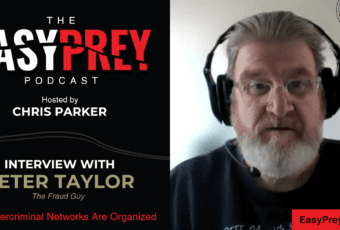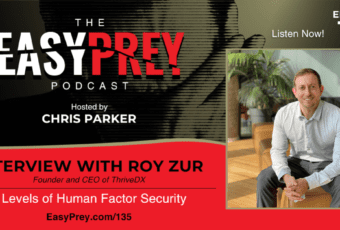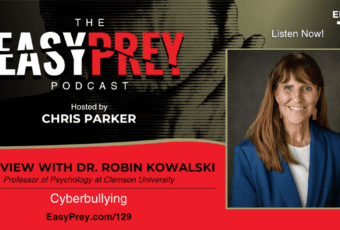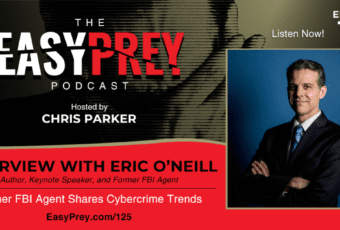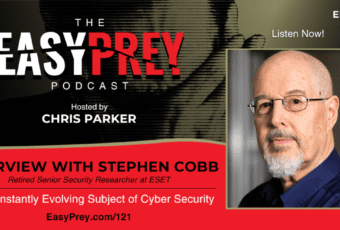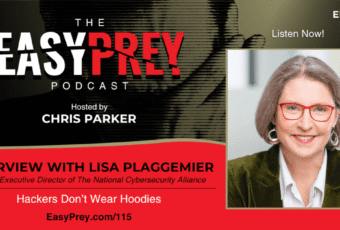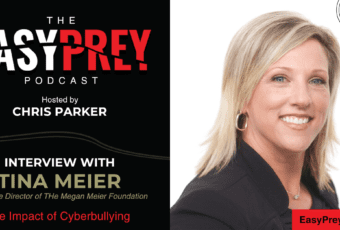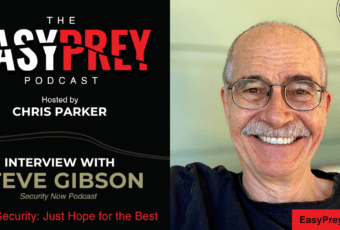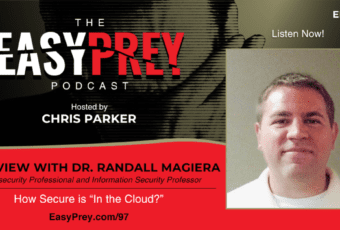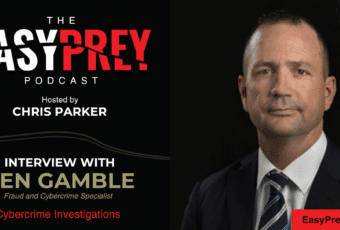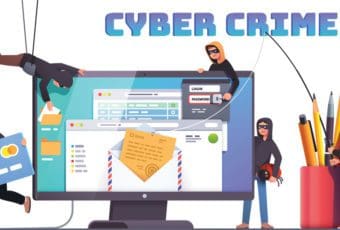Today’s guest is Peter Taylor. Peter is a former police detective and Director of Fraud Management for major UK companies. Ten years ago he set up his own consultancy and has established a reputation as “The Fraud Guy” specializing in research, training, and investigation around organized crime.
Many believe that cybersecurity is for high tech professionals only. It’s important to know that employees at every level can accidentally open the door to your network. Today’s guest is Roy Zur. Roy is the founder and CEO of Thrive DX for Enterprise which is a global education company committed to transforming lives through digital skills training and solutions as well as addressing the human factor of cybersecurity training. Roy is a 15 year veteran of the Israeli Defense Force where he served as a major. Roy also serves as the adjunct professor in Risk Management and Cybersecurity. He is the founder and chairman of the non-profit Israeli Institute for Policy and Legislation and a member of the Forbes Business Council.
Today’s guest is Dr. Robin Kowalski. Dr. Kowalski is a professor of Psychology at Clemson University. She obtained her PhD in Social Psychology from the University of North Carolina Greensboro. Her research interests focus primarily on adverse interpersonal behaviors, most notably complaining, teasing, and bullying with a particular focus on cyberbullying.
Working from home has increased the ability for cyber criminals to exploit companies. Listen on for how to be sure that the email you received isn’t from someone impersonating someone else. Today’s guest is Eric O’Neill. Eric is a security expert and author that presents keynotes internationally about espionage, national security, cyber security, fraud, corporate diligence and defense, and of course, hacking. Eric has worked as an FBI counterterrorism and counterintelligence operative, national security attorney, and a corporate security consultant. He founded The Georgetown Group, a premier investigative and security business firm. Eric is also the national security strategist for Carbon Black, the leader in next gen endpoint security and serves on the general council for global communities and international security.
There’s always risk when using technology, but your perception of the exposure will determine how active you are at minimizing the danger. Today’s guest is Stephen Cobb. Stephen is a best-selling author and award winning technologist with over 30 years experience in digital security and data privacy. He has authored more than a dozen textbooks on PC and LAN security as well as software usage. As a CISSP since 1996, he co-founded two successful security startups and earned a Master’s in security and risk management. Stephen now researches harm caused by the abuse of digital technology.
Everyone is at risk when they’re online. But there are simple security measures that you can implement that will make it more difficult to be hacked. Today’s guest is Lisa Plaggemier. Lisa is the Interim Executive Director for the National Cybersecurity Alliance. She has held executive roles with Ford Motor Company, InfoSec, and Media Pro. She is also a frequent speaker at major events and is a thought leader for innovative security trainings and awareness programs.
It is easy for people to create fake online profiles and say or do whatever they want as a cyberbully. They often don’t think through the possible consequences of their actions. Today’s guest is Tina Meier. Tina is the Executive Director of The Megan Meier Foundation. Her life was forever changed on October 16, 2006 when Tina’s 13 year old daughter Megan Taylor Meier took her own life after being cyberbullied by an adult neighbor posing as a fictitious boy named Josh Evans. Her belief is that if there is even just one child that struggles with bullying, cyberbullying, or self-harm, that is one too many and we must be there to help and support them.
When the internet began, trust was implied. But today, how can you know who or what to trust on the web? Today’s guest is Steve Gibson. Steve has participated in the PC industry since its inception. He authored InfoWorld’s top rated Tech Talk column for eight years and he produces the TWiT Network’s weekly Security Now podcast in its 17th year. He developed a working replacement for the username and password site known as QRL and is best known for his 35 year old SpinRite mass storage and data recovery and maintenance utility which he continues to develop.
Today’s guest is Dr. Randall Magiera. Dr. Magiera is a cybersecurity professional with over 15 years of experience in security management, change management, risk analysis, intrusion prevention and detection systems, and vulnerability assessments. He has a doctorate of science in cybersecurity, multiple advanced degrees in cybersecurity and technology, and certifications too numerous to list.
Today’s guest is Eric Jones. Eric is an experienced product manager and developer with over 20 years experience and more than 9 years in Agile Software Development. He is the founder and creator of All Knowing Parent focused on educating people on all avenues of technology and hardware.
Today’s guest is Ken Gamble. Ken is a professional investigator, corporate security specialist, and cybercrime expert with 33 years of experience working for individuals and multinational corporations. He is the co-founder and executive chairman of IFW Global that conducts fraud investigations, asset tracking, fraud recovery, disruption and prevention of global cybercrime, monitoring enforcement actions to protect and recover assets for worldwide clients. He is the current Australian chairman of the International Association of Cybercrime Prevention, a non-profit association founded in Paris in 2006. Ken is an accomplished surveillance specialist and former surveillance advisor contractor to a commonwealth government agency in Australia and a consultant to numerous law enforcement agencies in the US, Asia, and Europe as well as several foreign governments.
Every year, millions of people lose billions of dollars to fraud and scams. And the con artists won’t be going anywhere soon. New scams are created every day.
Surveys provide a ray of hope with the scam statistics. The good news is this: if we know what the top scams are, the harder it is to trick us. In other words, the more we know, the safer we are.
